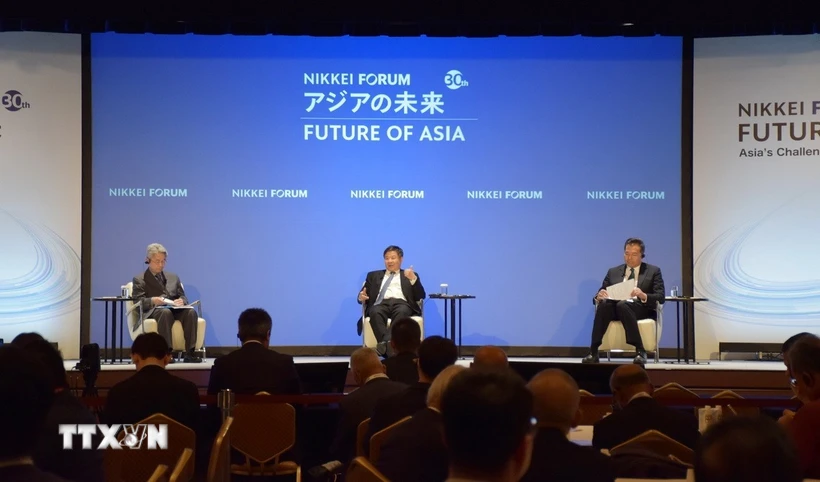
A discussion session at the 30th Future of Asia Conference. (Photo: Nguyen Tuyen/VNA)
On May 29, the 30th Future of Asia Conference opened in Tokyo (Japan) with the theme "Asia's Challenges in a Turbulent World ."
Along with Japanese Prime Minister Shigeru Ishiba as the host government leader, this year's Future of Asia Conference was attended by heads of state and government including Lao General Secretary and President Thongloun Sisoulith; Palau President Surangel Whipps Jr.; Cambodian Prime Minister Hun Manet; head of the Bangladesh interim government Muhammad Yunus; Vietnamese Deputy Prime Minister Nguyen Chi Dung, Singaporean Deputy Prime Minister Gan Kim Yong, Philippine Foreign Minister Enrique Manalo and Thai Foreign Minister Maris Sangiampongsa.
Speaking on the first day of the 30th Conference on the Future of Asia, Japanese Prime Minister Ishiba mentioned the role of the Global South and emphasized: "As the importance of the Global South increases in the international community and the presence and voice of Asia in particular increases, expectations and responsibilities for the role of Asian countries in global governance are increasing."
The Japanese leader said that as protectionism and inward-looking trends are on the rise worldwide, Asian countries, as the world's growth center, should cooperate and demonstrate to the world the importance of a free and fair economic order based on rules.
The Japanese Prime Minister said he will explore the possibility of cooperation between members of the Comprehensive and Progressive Agreement for Trans-Pacific Partnership (CPTPP) and regional organizations such as the Association of Southeast Asian Nations (ASEAN) and the European Union (EU).
Mr. Ishiba also emphasized the importance of cooperation with ASEAN. He said: "When I visited Malaysia, Indonesia, Vietnam and the Philippines, we realized that we have built a mutually beneficial relationship in the energy sector including liquefied natural gas (LNG)."
Prime Minister Ishiba pledged that Japan will continue its efforts to promote peace, stability and prosperity in the Indo-Pacific region and the international community" as well as "pursue future-oriented initiatives."
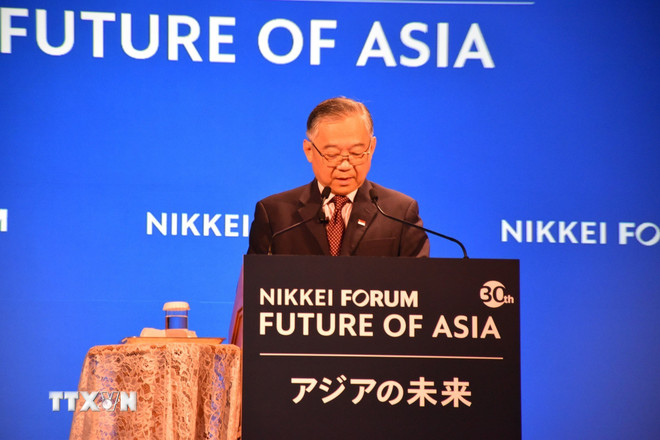
Singapore's Deputy Prime Minister Gan Kim Yong speaks at the 30th Future of Asia Conference. (Photo: Nguyen Tuyen/VNA)
Meanwhile, Singapore's Deputy Prime Minister Gan Kim Yong urged countries across Asia to "form a new coalition" to address common trade policy issues as the global trading system is restructuring after the US imposed heavy tariffs.
Mr Gan Kim Yong said that "the rules-based order in trade is being undermined" and proposed that countries form new economic alliances by "building on existing economic groupings and multilateral agreements."
The Singaporean Deputy Prime Minister cited the example of ASEAN moving towards deeper economic ties with the Gulf Cooperation Council (GCC) with a possible trade agreement.
Singapore's Deputy Prime Minister Gan Kim Yong also noted that the CPTPP trade agreement, which Singapore and several Asian countries are part of, is looking to expand economic cooperation with ASEAN and the European Union. He said such initiatives for deeper cooperation "could take the form of dialogue at the outset and expand to potential areas of cooperation such as trade facilitation or supply chain resilience."
Singapore's Deputy Prime Minister believes: "These new alliances will facilitate effective and timely cooperation on important trade policy issues and demonstrate our commitment to a rules-based trading system." He said it is important for multilateral organizations such as the CPTPP and the 15-member Regional Comprehensive Economic Partnership (RCEP) to "demonstrate to the rest of the world that, despite disputes and complexities, there is still room for cooperation and collaboration."
ASEAN and the CPTPP should expand cooperation with other partners and expand into areas such as trade and industry. Singapore encourages “other countries to join the CPTPP,” he added, referring to China and Indonesia, which have applied to join.
Mr. Gan Kim Yong also emphasized the need for “deeper digital integration” in the region. He estimated that by using the ASEAN Digital Economy Framework Agreement (DEFA) to accelerate the interoperability of digital identity and payment systems to promote cross-border digital trade, the region’s digital economy has the potential to double in size to $2 trillion by 2030.
In her speech at the conference, Thai Foreign Minister Maris Sangiampongsa stressed the importance of building closer ties among regional trading partners to overcome global disruptions.
Asian economies cannot rely solely on “traditional markets,” he said, but “will need to make every effort to diversify access to new markets.” He added that Asian countries should “strengthen cooperation to mitigate the impact of ongoing conflicts.”
Mr Maris said there was “great potential” in expanding RCEP. Existing trade and investment frameworks, such as the ASEAN-Japan Comprehensive Economic Partnership, should be fully integrated or expanded, the Thai foreign minister said. He added that new trade agreements should be established, as Thailand pursues pacts with the EU, the UK and South Korea, among others.
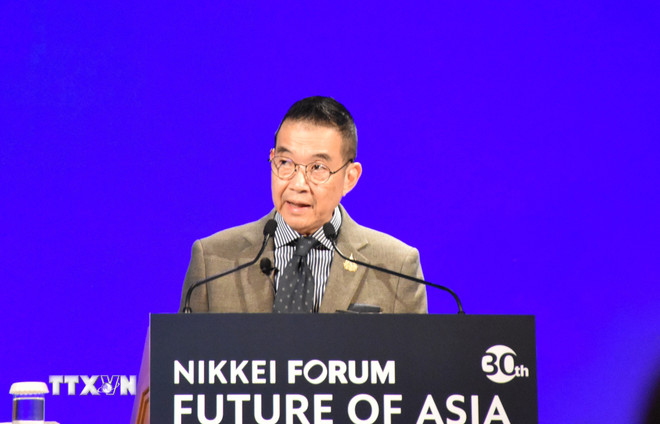
Thai Foreign Minister Maris Sangiampongsa speaks at the 30th Future of Asia Conference. (Photo: Nguyen Tuyen/VNA)
“We must deepen regional economic integration and remain steadfast in our commitment to free and open economies,” the Thai foreign minister stressed. This means promoting trade connectivity in all aspects, promoting high-quality investment and diversifying markets as a measure to insulate against the spillover effects of tariff wars between major powers, he said.
In an interview with a VNA reporter on the sidelines of the 30th Future of Asia Conference, Mr. Nakazawa Katsunori - Executive Vice President of the Japan External Trade Organization (JETRO), emphasized that Asia is and will continue to be the core of the world economy and this region has the power to connect everything.
Citing the speeches of the Deputy Prime Minister of Singapore and the Foreign Minister of Thailand at the conference, Mr. Nakazawa Katsunori said that the world is interconnected and interdependent, so if Asia does not act, it will not happen. He said that the world is being divided so Asia must take the lead now, for the benefit of the world and for future generations.
Assessing the role of Japan, he said that in the past, Japan may have made advances in technology. However, that advantage is probably not as great as it is now. Instead, he believes that new value will be created in the process of working together, which has been and is being cultivated. Therefore, he said, "the most important thing is that we think together, then work together and find solutions together."
The conference is considered one of the most important global forums in Asia, bringing together political leaders, business leaders and leading scholars to frankly exchange views on regional issues and the role of Asia./.
(TTXVN/Vietnam+)
Source: https://www.vietnamplus.vn/viet-nam-du-hoi-nghi-tuong-lai-chau-a-lan-thu-30-tai-nhat-ban-post1041516.vnp






![[Photo] National Assembly Chairman Tran Thanh Man attends the VinFuture 2025 Award Ceremony](/_next/image?url=https%3A%2F%2Fvphoto.vietnam.vn%2Fthumb%2F1200x675%2Fvietnam%2Fresource%2FIMAGE%2F2025%2F12%2F05%2F1764951162416_2628509768338816493-6995-jpg.webp&w=3840&q=75)
![[Photo] 60th Anniversary of the Founding of the Vietnam Association of Photographic Artists](/_next/image?url=https%3A%2F%2Fvphoto.vietnam.vn%2Fthumb%2F1200x675%2Fvietnam%2Fresource%2FIMAGE%2F2025%2F12%2F05%2F1764935864512_a1-bnd-0841-9740-jpg.webp&w=3840&q=75)
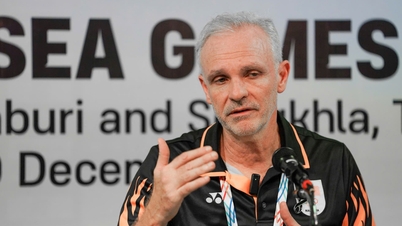




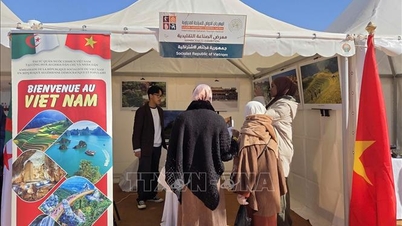

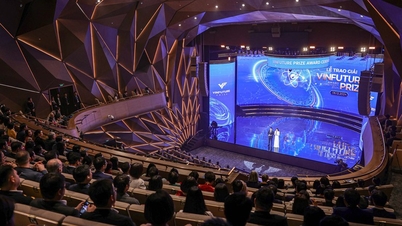

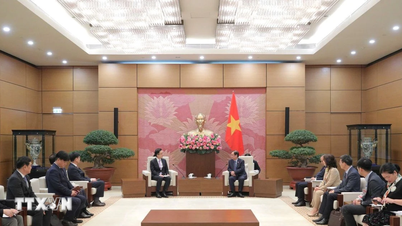
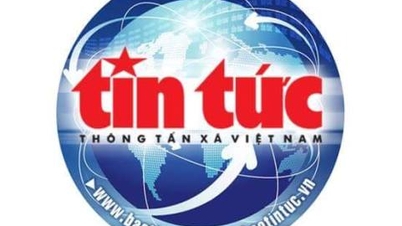
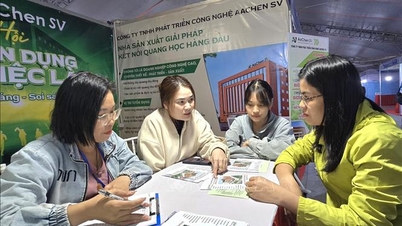

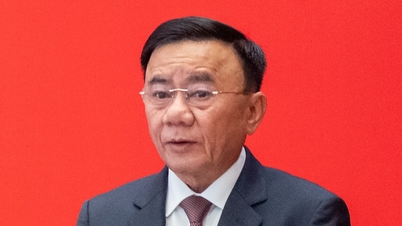
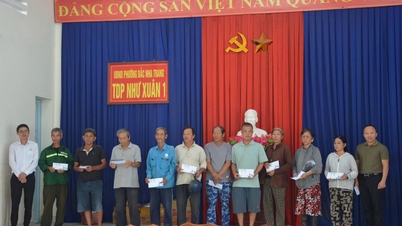
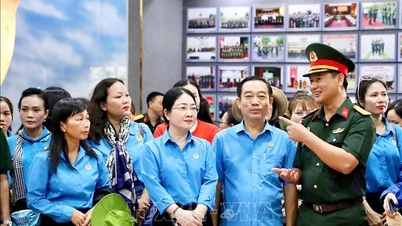




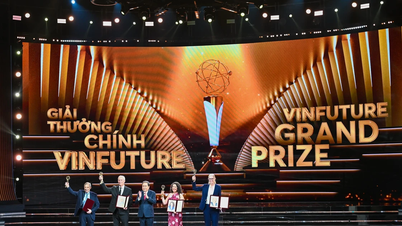
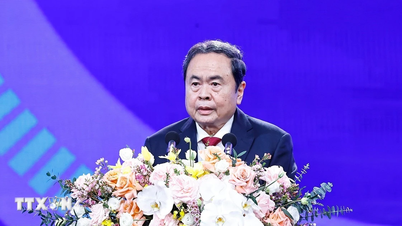
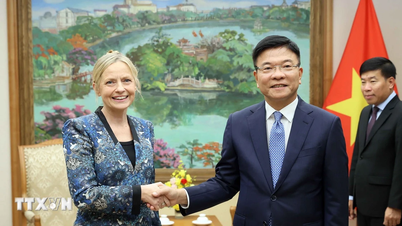
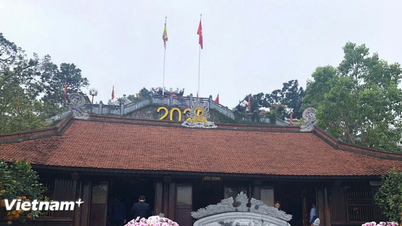










































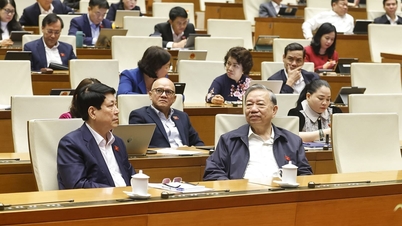














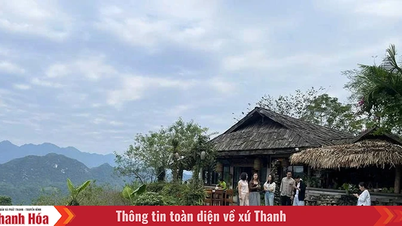

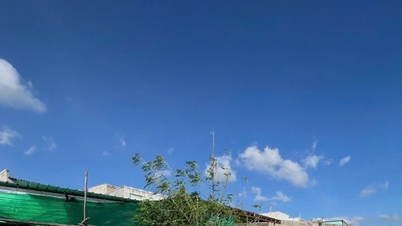
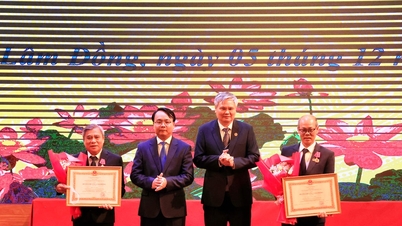












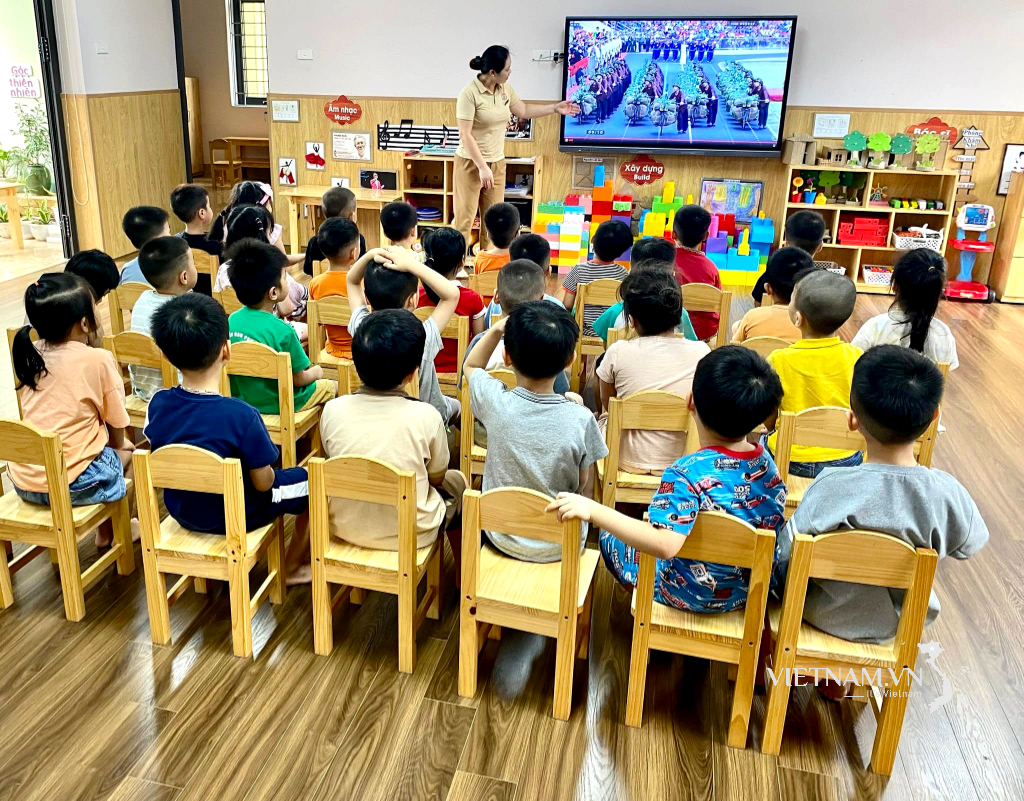




Comment (0)